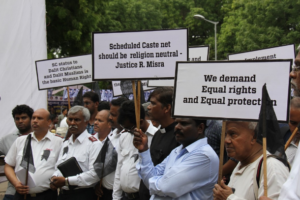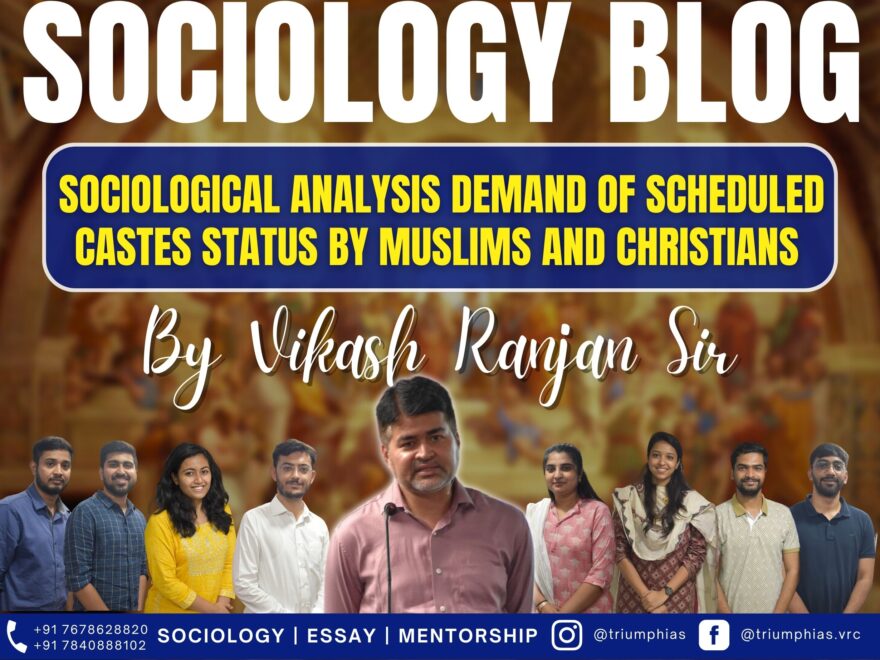Sociological Analysis Demand of Scheduled Castes Status by Muslims and Christians
(Relevant for Sociology Optional for Civil Services Examination)
Paper 1: Law And Social Change, Paper 2: Caste System , Problem Of Religious Minorities

Context
Recently, the Supreme Court has sought the government’s position on petitions challenging the Constitution (Scheduled Castes) Order of 1950 (amended in 1956 & 1990), which allows only members of Hindu, Sikh and Buddhist religions to be recognised as Scheduled Castes.
Sociological Analysis :
Reservation
|
Basis for Reservation:
Article 14 and Classification: Article 14 of the Indian Constitution prohibits discrimination legislation but permits reasonable classification.
Who Was Initially Recognized in the 1950 Constitution Order: The 1950 Constitution (Scheduled Castes) Order acknowledged only Hindus as Scheduled Castes.
Amendments in 1956 and 1990: Amendments in 1956 and 1990 added Dalits who converted to Sikhism (1956) and Buddhism (1990) respectively. These amendments were influenced by reports from the Kaka Kalelkar Commission (1955) and the High Powered Panel (HPP) on Minorities, Scheduled Castesheduled Castes/ST (1983).
Reasons for Exclusion of Dalit Christians:
- Untouchability Practice: The practice of “untouchability” was a characteristic of Hinduism and its derivatives, not present in Islam or Christianity.
- Registrar General’s Caution: The Registrar General of India advised that Scheduled Castes status is intended for communities afflicted by social disabilities resulting from untouchability.
- Mandate and Approval for Inclusion: Inclusion mandates were established in 1999, necessitating approval from the Registrar General of India. The amendment including Buddhist converts in 1990 adhered to these rules.
- Article 341 Clause (2) Criteria: Dalits who converted to Christianity or Islam hailed from diverse caste groups, making it challenging to categorize them as a unified “single ethnic group” required for inclusion.
- “Foreign” Origins of Islam and Christianity: While not explicitly stated, the government implies that Islam and Christianity originated outside India, contrasting with Hinduism, Sikhism, and Buddhism.
- Scheduled Caste Identification Based on Specific Social Stigma: The concept of Scheduled Caste is rooted in particular social stigmas tied to communities listed in the Constitution (Scheduled Castes) Order, 1950.
- Different Conversion Contexts: Scheduled Castes converts to Buddhism voluntarily adopted the religion following Dr. Ambedkar’s call in allowing clear identification of their original castes/communities. This distinction is less clear for Christians and Muslims due to conversions occurring over centuries.
Argument for Inclusion:
- Reports on Caste Inequalities: Various independent commission reports have documented caste-based inequalities within Indian Christian and Muslim communities.
- Absence of Castes in Sikhism and Buddhism: Despite the absence of casteism in Sikhism and Buddhism, they were included in the Scheduled Castes list
- It is against article 14, 15,16,25 of constitution of India to exclude them. It is argued that it is against right to equality and non discrimination against any religion, and it violates freedom of religion .
- Historical evidences of caste recognition in Muslims: The Scheduled Castes List of 1936 includes various Muslim Dalit castes like the Halalkhor, Lalbegi, Nat, Dhobi in the United Provinces and Khatik and Mallah in Bombay.
- Reports of the National Commission for Safai Karamcharis: The reports confirm two important things: one, that sanitation work in India is steeped in untouchability even today, and two, many Dalit Muslim communities do sanitation jobs. Thus, even Dalit Muslims for sanitation work, where they are treated as untouchables.
Efforts to Extend Scheduled Castes Reservation to Converted Dalits:
- Legislative Initiatives:
- The Constitution (Scheduled Castes) Orders (Amendment) Bill, 1996, drafted but not introduced in Parliament.
- Ranganath Misra Commission (2004):
- Proposed complete delinking of Scheduled Castes status from religion.
- Advocated making Scheduled Castes religion-neutral, similar to Scheduled Castes Tribes.
- Sachar Committee (2005):
- Studied Muslims’ socio-economic conditions.
- Found Dalit Muslims’ and Christians’ situations didn’t significantly improve after conversion.
- Satish Deshpande’s Team (2008):
- Recommended extending Scheduled Castes status to Dalit Christians and Muslims.
- Rejected due to insufficient field data, hindering acceptance.
Efforts to include Dalits of other religions in Scheduled Castes reservation have involved proposed bills and comprehensive committee reports. Recommendations for religion-neutral status were made, but various factors, including data limitations, impacted their acceptance.
Related Blogs …
To master these intricacies and fare well in the Sociology Optional Syllabus, aspiring sociologists might benefit from guidance by the Best Sociology Optional Teacher and participation in the Best Sociology Optional Coaching. These avenues provide comprehensive assistance, ensuring a solid understanding of sociology’s diverse methodologies and techniques.
META TAGS:
Sociological Analysis, Scheduled Castesheduled Castesheduled Castes, Constitution (Scheduled Castesheduled Castesheduled Castes) Order of 1950, Amendment 1956, Amendment 1990, Reservation Policy, Dalit Muslims, Dalit Christians, Ranganath Misra Commission, Sachar Committee, Social Stigma, Article 14, Religious Minorities, Social Change, UPScheduled Castesheduled Castes Sociology, Law and Social Change, Caste System, Sociological Analysis
Why Vikash Ranjan’s Classes for Sociology?
Proper guidance and assistance are required to learn the skill of interlinking current happenings with the conventional topics. VIKASH RANJAN SIR at TRIUMPH IAS guides students according to the Recent Trends of UPScheduled Castesheduled Castes, making him the Best Sociology Teacher for Sociology Optional UPScheduled Castesheduled Castes.
At Triumph IAS, the Best Sociology Optional Coaching platform, we not only provide the best study material and applied classes for Sociology for IAS but also conduct regular assignments and class tests to assess candidates’ writing skills and understanding of the subject.
Choose The Best Sociology Optional Teacher for IAS Preparation?
At the beginning of the journey for Civil Services Examination preparation, many students face a pivotal decision – selecting their optional subject. Questions such as “which optional subject is the best?” and “which optional subject is the most Scheduled Castesheduled Castesoring?” frequently come to mind. Choosing the right optional subject, like choosing the best sociology optional teacher, is a subjective yet vital step that requires a thoughtful decision based on facts. A misstep in this crucial decision can indeed prove disastrous.
Ever since the exam pattern was revamped in 2013, the UPScheduled Castesheduled Castes has eliminated the need for a second optional subject. Now, candidates have to choose only one optional subject for the UPScheduled Castesheduled Castes Mains, which has two papers of 250 marks each. One of the compelling choices for many has been the sociology optional. However, it’s strongly advised to decide on your optional subject for mains well ahead of time to get sufficient time to complete the syllabus. After all, most students Scheduled Castesheduled Castesore similarly in General Studies Papers; it’s the Scheduled Castesheduled Castesore in the optional subject & essay that contributes significantly to the final selection.
“A sound strategy does not rely solely on the popular
Opinion of toppers or famous YouTubers cum teachers.”
It requires understanding one’s ability, interest, and the relevance of the subject, not just for the exam but also for life in general. Hence, when selecting the best sociology teacher, one must consider the usefulness of sociology optional coaching in General Studies, Essay, and Personality Test.
The choice of the optional subject should be based on objective criteria, such as the nature, Scheduled Castesheduled Castesope, and size of the syllabus, uniformity and stability in the question pattern, relevance of the syllabic content in daily life in society, and the availability of study material and guidance. For example, choosing the best sociology optional coaching can ensure access to top-quality study materials and experienced teachers. Always remember, the approach of the UPScheduled Castesheduled Castes optional subject differs from your academic studies of subjects. Therefore, before settling for sociology optional, you need to analyze the syllabus, previous years’ pattern, subject requirements (be it ideal, visionary, numerical, conceptual theoretical), and your comfort level with the subject.
This decision marks a critical point in your UPScheduled Castesheduled Castes – CSE journey, potentially determining your success in a career in IAS/Civil Services. Therefore, it’s crucial to choose wisely, whether it’s the optional subject or the best sociology optional teacher. Always base your decision on accurate facts, and never let your emotional biases guide your choices. After all, the search for the best sociology optional coaching is about finding the perfect fit for your unique academic needs and aspirations.
Follow us :
🔎 https://www.instagram.com/triumphias
🔎https://www.youtube.com/c/TriumphIAS
https://t.me/VikashRanjanSociology
Find More Blogs
|
|
|
|
Modernity and social changes in Europe |


3 comments